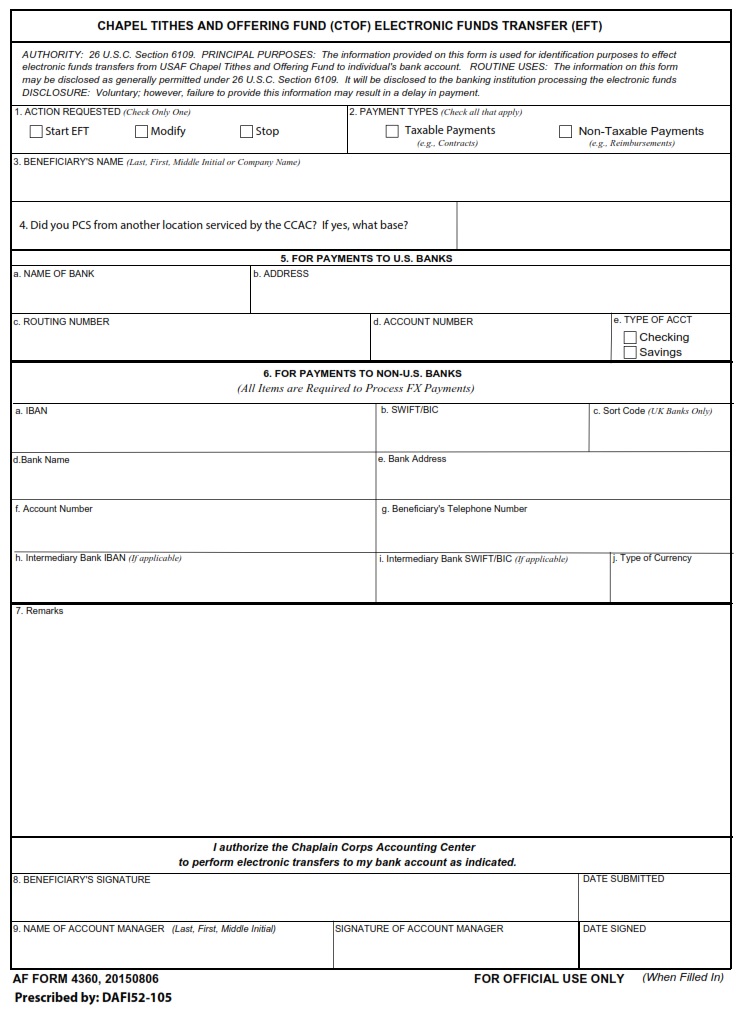AF-FORMS.COM – AF Form 4360 – Chapel Tithes And Offering Fund (CTOF) Electronic Funds Transfer (EFT) – AF Form 4360 is a crucial document for the Chapel Tithes and Offering Fund (CTOF) Electronic Funds Transfer (EFT) process. This form is used to authorize and track electronic transfers of funds from church members’ bank accounts to the CTOF account. With more churches moving towards digital donations, AF Form 4360 has become an essential tool for ensuring that the transfer process is secure, accurate, and transparent.
In this article, we’ll take a closer look at what AF Form 4360 entails, its importance in managing CTOF donations, and how it streamlines the EFT process.
Download AF Form 4360 – Chapel Tithes and Offering Fund (CTOF) Electronic Funds Transfer (EFT)
| Form Number | AF Form 4360 |
| Form Title | Chapel Tithes and Offering Fund (CTOF) Electronic Funds Transfer (EFT) |
| Edition Date | 8/6/2015 |
| File Size | 806 KB |
AF-Form-4360-Chapel-Tithes-And-Offering-Fund-CTOF-Electronic-Funds-Transfer-EFT.pdf (93 downloads )
What is an AF Form 4360?
An AF Form 4360 is a document used in the United States Air Force to facilitate electronic funds transfer for Chapel Tithes and Offering Funds (CTOF). This form is designed to help members of the Air Force make contributions to their chapel or religious organization through automated means. By using an EFT system, members can easily contribute money from their paychecks on a regular basis, without having to worry about writing checks or carrying cash.
The AF Form 4360 requires users to provide certain information, such as their name, rank, and Social Security number. They must also specify the amount they wish to contribute each month and designate the recipient of those funds. The form must then be signed by both the member making the contribution and a designated representative from the religious organization receiving it.
Overall, the use of AF Form 4360 helps streamline tithing and charitable giving within the Air Force community. It allows for efficient tracking of funds and ensures that contributions are directed toward intended recipients in a secure manner.
Where Can I Find an AF Form 4360?
If you are looking for an AF Form 4360 to facilitate Chapel Tithes and Offering Fund (CTOF) Electronic Funds Transfer (EFT), there are several options available. The easiest way to find the form is by searching for it online. There are many websites that offer a free download of the document, which can be filled out electronically or printed and filled out manually.
Another option is to visit your local Air Force installation or chapel office. These offices should have copies of the form readily available, and staff members may be able to answer any questions you have about filling it out correctly. Additionally, if you attend services at a specific chapel, they may also have copies of the AF Form 4360 on hand.
Finally, if all else fails, you can contact the Air Force’s financial management office directly and request a copy of the form. They will likely ask for some information from you so they can send it over quickly and efficiently. Overall, finding an AF Form 4360 shouldn’t be too difficult as long as you know where to look!
AF Form 4360 – Chapel Tithes And Offering Fund (CTOF) Electronic Funds Transfer (EFT)
The AF Form 4360 is a financial document that authorizes the Chapel Tithes and Offering Fund (CTOF) Electronic Funds Transfer (EFT). This form is used by active duty members, retirees, and Department of Defense civilians to set up automatic donations to support their chapel’s religious activities. The CTOF EFT program allows members to contribute a portion of their paychecks or other income sources directly to the fund.
This convenient method of donating ensures that funds are regularly received by chapels for upkeep, maintenance, and other operational expenses. The use of electronic transfers also minimizes paperwork and reduces administrative costs associated with processing manual transactions. CTOF EFT contributions can be canceled or modified at any time by submitting a new AF Form 4360. Overall, this system helps strengthen the bonds between military members and their communities through supporting religious services on base.
